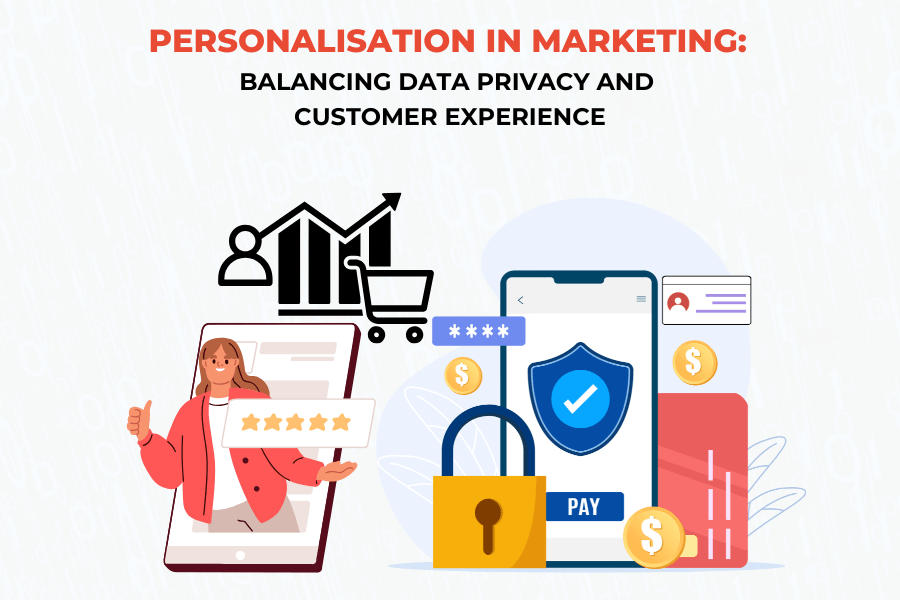
Personalisation in marketing: Balancing data privacy and customer experience
In Australia, personalisation in marketing has become a cornerstone for businesses seeking to engage customers in an increasingly digital world. With consumers expecting brands to anticipate their needs and deliver tailored experiences, personalisation offers a powerful way to connect. However, as businesses rely on customer data to drive these personalised experiences, they must also navigate the growing concern over data privacy.
Balancing personalisation with data privacy is crucial to building trust and loyalty with Australian consumers. By exploring local data privacy laws, understanding consumer attitudes, and learning from both Australian and global best practices, businesses can deliver personalised experiences while safeguarding privacy.
The Australian landscape: Privacy and personalisation
1. Australian data privacy regulations
Australia’s regulatory framework, anchored by the Privacy Act 1988 and its amendments, sets strict guidelines for how businesses must handle personal information. The Privacy Act requires businesses to provide transparency in their data collection practices, ensure the secure storage of data, and give individuals the right to access and correct their personal information.
Recent reviews of the Privacy Act aim to strengthen privacy protections further, with proposals for more robust consent requirements, the right for individuals to opt out of targeted advertising, and higher penalties for non-compliance. As a result, businesses must stay vigilant to ensure that their personalisation strategies comply with these regulations.
2. Australian consumer attitudes toward data privacy
Australians are becoming more vigilant about their data privacy, with a 2023 (Australian Community Attitudes to Privacy Survey (ACAPS) report highlighting that 62% view the protection of their personal information as a major concern in their lives. While many are taking action—82% care enough about data privacy to try to protect it—57% are unsure of what steps to take.
This lack of control is further reflected in the fact that only 32% of Australians feel they have control over their data privacy, with 84% wanting more say in how their information is collected and used.
Data breaches are a significant worry, with 74% of Australians considering them one of the most significant privacy risks they face today. This concern has surged by 13 percentage points since 2020, driving people to adopt more cautious behaviour, such as verifying messages or calls before providing personal information and using unique, secure passwords.
Despite these concerns, Australians still value personalisation. Data privacy is now the third most important factor, after price and quality, when choosing a product or service.
The challenge businesses face is balancing this need for privacy with personalisation—often referred to as the "privacy-personalisation paradox." For instance, while Australians want businesses to respect their data, over half (55%) are still willing to share some personal information to access services, with their name and email address being the most acceptable details to provide.
Ultimately, transparency and consumer control over data are key for businesses hoping to strike a balance between offering personalised services and respecting privacy concerns.
3. Australian case studies: Balancing personalisation and privacy
Several Australian companies are finding ways to balance personalisation with privacy, ensuring that customers enjoy relevant, tailored experiences without compromising their data security.
For example, Telstra, Australia’s leading telecommunications provider, implemented a customer-first approach to data collection and personalisation. Through its My Telstra app, customers are provided with personalised recommendations and offers based on their usage patterns, but Telstra also emphasises transparency, giving users control over how their data is collected and used. Customers can opt out of personalised services while still receiving essential updates, striking a balance between engagement and privacy.
Another standout example is Commonwealth Bank’s AI-powered app, CommBank App, which provides personalised spending insights and budgeting tools. While offering tailored recommendations, the bank ensures all data is encrypted and anonymised, further aligning with Australia’s stringent privacy laws while enhancing user experience.
Global context: International trends and best practices
1. Comparing Australian regulations with global counterparts
Australia’s Privacy Act provides a robust framework, but it’s important to compare it with global standards to understand where Australia fits in the international landscape.
- GDPR (Europe): The General Data Protection Regulation (GDPR) is often considered the gold standard in data privacy. It mandates explicit consent for data collection, a right to be forgotten, and heavy penalties for non-compliance. While Australia’s Privacy Act is strong, GDPR’s emphasis on consumer rights—particularly in terms of explicit consent—sets a benchmark for Australian businesses looking to serve European clients or adopt international best practices.
- CCPA (California): The California Consumer Privacy Act (CCPA) is another influential law that gives consumers the right to know what personal information is collected and opt out of its sale. While Australia’s Privacy Act aligns with many CCPA principles, the CCPA’s focus on allowing consumers to stop the sale of personal data is a feature Australia’s privacy landscape may look to emulate as data-driven marketing evolves.
2. International trends in personalisation and data privacy
Globally, personalisation continues to evolve as businesses adopt advanced technologies like artificial intelligence (AI) and machine learning (ML). These tools help marketers deliver hyper-personalised experiences without overstepping privacy boundaries by using anonymised data and predictive analytics.
For example, global e-commerce giant Amazon uses AI to personalise product recommendations while adhering to strict data privacy guidelines. By using aggregated, anonymised data, Amazon can predict customer preferences without violating personal data privacy, offering a model that Australian businesses can follow.
In the digital marketing sphere, companies are increasingly shifting toward zero-party data—information that consumers voluntarily provide—such as preferences or feedback. This not only strengthens consumer trust but also complies with privacy laws across regions. For Australian businesses, focusing on zero-party data is a smart strategy for balancing personalisation with privacy.
Best practices for balancing personalisation and privacy in Australia
For Australian businesses, delivering personalisation while complying with data privacy regulations requires strategic planning. Here are some best practices to consider:
1. Emphasise transparency
One of the most effective ways to address the privacy-personalisation paradox is through transparency. Make it clear to customers how their data is collected, why it’s being used, and the benefits they’ll receive in return. Implement privacy policies that are easy to understand, avoiding jargon, and clearly outline the choices customers have regarding their data.
2. Prioritise consent management
With ongoing amendments to the Privacy Act, businesses must prioritise consent management. Implementing a robust Consent Management Platform (CMP) ensures that customer preferences are respected and aligned with the latest privacy laws. Providing users with control over their data, including the ability to opt out of certain types of data collection, will build trust and enhance customer experience.
3. Adopt privacy-first personalisation techniques
Australian businesses should look toward privacy-first approaches to personalisation, such as:
- Zero-party data: Encourage customers to willingly share data by offering value in return. This could be through interactive surveys, preference centers, or rewards programs.
- Contextual targeting: Serve personalised ads based on the context of the user’s current activity rather than relying on third-party tracking. For example, an outdoor adventure brand could target users browsing travel blogs with relevant product recommendations.
- AI-powered personalisation: Use AI tools to analyse anonymised data and predict customer preferences, delivering personalised experiences without infringing on personal privacy.
The future of personalisation and privacy in Australia
As Australian businesses navigate the complexities of personalisation and data privacy, it’s clear that both are essential to delivering exceptional customer experiences. By staying informed on local regulations, adopting global best practices, and implementing privacy-first personalisation techniques, Australian brands can maintain consumer trust while delivering the relevant, engaging experiences customers expect.
For businesses, the key to success lies in transparency, consent management, and leveraging innovative technologies that prioritise privacy without sacrificing the benefits of personalisation. The future of marketing in Australia will be shaped by those who can master this delicate balance.
Personalisation and privacy: Elevating your brand’s marketing strategy
In today’s marketing landscape, personalisation is essential for creating meaningful customer engagement and fostering long-term loyalty. Businesses that leverage cutting-edge personalisation techniques can build strong connections with their audience while respecting customer privacy.
As data privacy remains a growing concern, brands must ensure their marketing efforts not only comply with Australia’s Privacy Act but also meet consumer expectations for transparency and security. The right balance between personalisation and privacy helps businesses create an engaging, relevant experience without sacrificing customer trust.
Looking to enhance your marketing strategy with responsible personalisation? Discover how the right techniques can drive results while prioritising privacy, ensuring your brand stands out in an increasingly competitive market. Contact us on 03 7046 4688 to get started.
